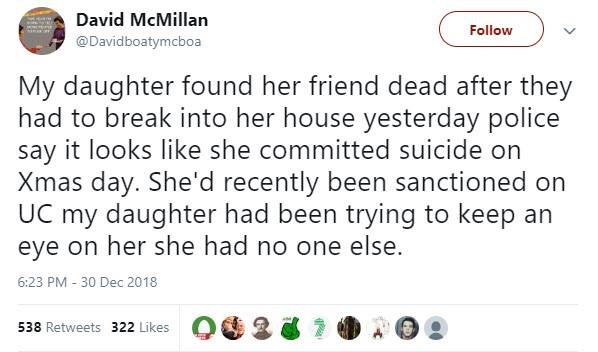And so the DWP cruelty continues and we shouldn’t be surprised.
Unpaid carers have been told by the DWP (Department Of Work And Pensions) to repay thousands of pounds of benefits after unknowingly earning too much money years ago.
Not only is this cruel it was entirely preventable if the DWP had done their jobs correctly. But forcing unpaid to pay back thousands is unbelievable especially when they save the government millions every year.
The DWP system shows when carers have gone over the earnings limit but they failed to inform claimants instead allowing their claims to continue for months or even years before recovering the full amount owed.
This has also been highlighted in a series of articles by Patrick Butler in The Guardian which shows exposing the cruelty in how they treat unpaid carers
Along with this the folks over at Benefits And Work have raised the reasons why the DWP should never get the police powers they desperately want.
This also proves why the DWP should never be given police powers.
This has resulted in the DWP given free reign to threaten carers with jail terms.
They have also used laws that were designed to strip drug dealers of their property to take money from carers.
The DEP have unlawfully ignored judges legal directions in order to increase the amount they can take back from carers.
The DWP have been shown to misleed MPs for years by promising that new technology meant large overpayments would no longer happen.
Alongside this they are refusing to publish a report on the effects of overpayment recovery on carers which was completed years ago.
Take for example the heart breaking case of Vivienne Groom who cared for her elderly mother who had dementia and suffered from a stroke is a disturbing example of how the DWP treat carers.
Vivienne was given incorrect advice from a social worker that she didn’t need to declare her part-time minimum wage at the Co-Op job to the DWP whilst still receiving carers allowance.
When her hours increased she did inform the DWP, who said they would get back to her.
Unsurprisingly they never did reply to her.
Years later she was threatened with prosecution and began repaying the overpayment at £30 a month.
This is a large amount of money for her to replay each month but she did so.
Her mother sadly died and left her a £16,000 inheritance. The DWP went on to prosecute Vivienne using the Proceeds of Crime Act.
This was created to take expensive cars and large houses from drug dealers, not people who have cared for loved ones
They also threatened her with up to seven years in prison in order to steal her inheritance.
Vivienne decided to take legal action and was refused legal aid because she had £16,000 in capital even though she couldn’t access it because the DWP had her account frozen the day the money went into her bank account.
The case ended with the DWP legal team ignoring judges directions on three separate occasions to make calculations that may have reduced the amount Vivienne owed and, instead, getting the whole of her inheritance.
It’s extremely disturbing that the possibility that a vengeful organisation as is the DWP could be given the power to search claimants homes, seize their possessions and prosecute them or impose fines upon them must be challenged whenever it is raised.
As proven time after time the DWP will ignore a judges ruling and will appeal any decisions made in a court of law.
It’s wrong, beyond cruel . The government should be thanking unpaid carers for the work that they do because ultimately they save the government millions of pounds each year.
It’s our job to challenge this whenever possible and share articles to raise awareness because believe it or not there are people that aren’t aware that this does and will continue to happen.
A huge thank you to Patrick Butler for his hard work in producing these interviews
Also thanks to the folk over at Benefit And Work for the hard work that they do to help people.

Thanks to my partner for sending me the article as soon as it was published.
This time of the year is especially hard for me because of the anniversary of my son’s passing and everything that went along with that.
This is why I’ve been absent from social media because it’s tough for me to handle but I will be back to normal soon
Thank you for your patience











